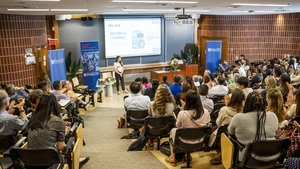Empowering you to create innovative solutions that drive global change through the power of education.
The Education Entrepreneurship, M.S.Ed. program understands the urgency of addressing the world's most pressing challenges. This one-year, executive program will equip you with the tools to design, test, and implement forward-thinking solutions in an ever-evolving global landscape. Here, education is the catalyst for transformative impact, and through our innovative approach, you’ll not only tackle critical issues but also contribute to the greater good.
Program Details
-
Summer Entry Term
-
Executive* Enrollment Format
-
12 Months Duration
-
Hybrid Modality
Overview
Through its unique design at the intersection of education, business, and entrepreneurship, the Master's in Education Entrepreneurship program empowers current and aspiring leaders with the critical academic knowledge, cross-sector tools, business skills, and entrepreneurial mindset necessary to create innovative solutions in education.
Built for working professionals from a wide range of industries and functions seeking to innovate within an existing organization and for education and business leaders, entrepreneurs, and others interested in building and accelerating new ventures, students develop expertise in three key domains: Education Foundations, Business Essentials, and Entrepreneurial Leadership. This curriculum is complemented with premier access to Penn GSE and Wharton startup resources and clubs, education and ed tech networks, school design labs, and professional development across the innovation ecosystem.
Across the program, students work with renowned faculty from the University of Pennsylvania Graduate School of Education, The Wharton Business School, Weitzman School of Design, and the School of Engineering and Applied Science to identify emerging opportunities and create the next generation of high-impact education programs, products, and services. In the 12-month Capstone project, students work with industry leaders and entrepreneurs to identify a new opportunity for education innovation based on their own personal mission and professional goals.
Our Students
Students in this program form a dynamic global community of change-makers—leaders who support one another in creating impact while achieving success.
Our students represent a global network, spanning North America, Central and South America, Europe, Africa, and Asia. They bring expertise from industries such as education technology, business and consulting, schools and universities, philanthropy, and venture capital. Among them are entrepreneurs, educators, nonprofit leaders, healthcare professionals, and many others who share a commitment to creating positive change.
These are adult learners (ages 22–60+) who share a common goal: to make their communities better. Our students include seasoned professionals, serial entrepreneurs, early-career founders, global leaders, and career changers—all united by a passion for impact and growth.
Global Impact Fellowship
This fellowship provides financial support and expert mentorship to empower Education Entrepreneurship, M.S.Ed. students in launching successful education or edtech ventures. Learn more about the fellowship.
Take the Next Step
Application Requirements and Deadlines Tuition and Fees Financial Aid
STEM OPT Extension Eligible Beginning Summer 2026This STEM-designated master’s program provides students with an F1 status the opportunity to work in the U.S. for up to 3 years after graduation—1 year of OPT plus a 2-year STEM OPT extension. |

Hear From Our Alum
“The Education Entrepreneurship program gave me the tools to validate, redesign, and accelerate my work without losing focus. With its powerful blend of theory and real-time execution, I grew enrolled students at Motherly Notes by over 50% during my time in the program. The experience also enabled me to launch a second elite online school, Incubator School, built with one of the strongest education teams in the industry. Together, we are rebuilding education.”
Julie Liu, GED'25
Executive Director, Incubator School

Hear From Our Faculty
“When students start their program journey, they are asked to imagine an innovation in education that could fundamentally change the way we teach and learn in an increasingly digital and global marketplace”
Jenny Zapf, Ph.D., Program Director and Penn GSE Senior Fellow in Education
Upcoming Events
-
Time: 7:00 PM - 8:00 PM EDT | Location: Online
-
Time: 12:00 PM - 1:00 PM EDT | Location: Online
-
Time: 7:00 PM - 8:00 PM EDT | Location: Online
Curriculum
Through a 10 course unit program, students learn and apply new knowledge, theory, and skills in three domains: Education Foundations, Business Essentials, and Entrepreneurial Leadership. For more information on courses and requirements, visit the Education Entrepreneurship, M.S.Ed. program in the University Catalog.
Capstone Project
The program culminates a year of discovery with a capstone project, where students develop a paper with reflections and valuable marketplace tools, such as a financial model and a pitch deck. So far, students have created 400 capstone ventures. Learn more about the impact of past student capstone projects.
Wharton Dual-Degree Option
The Education Entrepreneurship, M.S.Ed. program also offers a dual-degree option for students in the Wharton M.B.A. to tailor their career goals. Learn more about the M.B.A./M.S.Ed. Dual-Degree option between Wharton and Penn GSE.
Do you have questions about the plan of study?
We are here to help! Contact the Assistant Director, Kaajal Vyas, gse-edent@gse.upenn.edu.
Designed for full-time working professionals, this program combines flexibility with an immersive learning experience. Students meet eight times throughout the year—seven times in person and once virtually—with additional online learning opportunities between sessions. This format gives students the option to stay rooted in their home communities, relocate to the U.S. for the year, or even travel between intensive sessions—all while continuing their careers.
Hotel accommodations are provided for the Summer I and Summer II onsite intensives, making it easy to focus on learning during these multi-day sessions. For Fall and Spring sessions, which typically run from Friday morning through Sunday afternoon, students arrange their own lodging. To make planning simple, Penn GSE offers guidance on preferred hotels and neighborhoods.
Executive Format Schedule: 2026-2027 Cohort
| Term | Dates |
|---|---|
| Summer 2026 | July 29 – August 6 |
| Fall 2026 | September 25–27 |
| October 30 – November 1 | |
| December 4–6 | |
| Spring 2027 | January 22–24 |
| February 26–28 (Virtual Intensive) | |
| March 19–21 | |
| Summer 2027 | June 12–17 |
Executive Format Schedule: 2025-2026 Cohort
| Term | Dates |
|---|---|
| Summer 2025 | July 27 - August 4 |
| Fall 2025 | September 26-28 |
| October 31 - November 2 | |
| December 5-7 | |
| Spring 2026 | January 9-11 |
| February 13-15 (Virtual Intensive) | |
| March 27-29 | |
| Summer 2026 | June 13-18 |
In the culminating capstone project, students identify a new opportunity—either for an existing entity or for the creation of a new venture—and implement the skills they have built in the program to launch their own education program, service, or product. Students build a business case, executing experiments that validate or invalidate key hypotheses governing the opportunity. The capstone culminates with a demo day where students pitch their ventures to a distinguished panel of judges.
The exploratory work for the capstone project begins on day one, with discovery-driven planning, ideation, and pitch practice. The second stage includes design thinking, market research, and rapid validation testing using lean methods. Designing learning environments, building venture financial models, and developing marketing plans are key elements in the third stage. In the final stage, students build integrated businesses cases for their education ventures, including financial models and pitch decks. Throughout the 12-month project, students pitch, test, iterate, pivot, and refine venture ideas through meetings with a team of mentors—including ed tech and school entrepreneurs, education intrapreneurs, business leaders, researchers, practitioners, and investors.
Project Components
At the completion of capstone project, students develop a strong business case for a real-world education solution or innovation that allows them to showcase their entrepreneurial skills and knowledge to potential employers, partners, and investors.
Common Topic Areas
- New school designs and programs
- Ed tech teaching and learning solutions
- Curriculum innovations
- New communities of practice
- Ed products and marketplaces
Sample Capstone Projects
New ventures(*) and existing entities that students strengthened through their programmatic work as both entrepreneurs and intrapreneurs:
- Jolt Education: A browser-extension tool that helps teachers seamlessly integrate a curated library of short, timely educational videos into Google Slides—boosting student engagement and simplifying lesson planning.
- Phunics: An online reading platform featuring 200+ leveled, decodable stories—each focused on a single phonics skill per passage—with interactive audio, quizzes, and teacher tools to help students build fluent, confident reading skills.
- Upsquad: A workforce ecosystem platform that connects employers, candidates, and training providers. It offers tools for personalized communication, training, community building, and job placement—transforming talent into qualified professionals.
- Kindred K-12: Empowers K–12 educators with AI-native, on-demand coaching, research-backed curriculum tools, and collaborative support, making teachers more effective, confident, and less stressed while enriching instruction.
- Motherly Notes: Delivers immersive, research-backed online Chinese language education for K–12 students—teaching over 500 characters a year while fostering fluency, confidence, and cultural connection.
- The Ivy Initiative: Provides fully subsidized, conservatory-level performing arts training and mentorship for NYC high school juniors and seniors—empowering underserved youth as creative changemakers.
- Post Pigeon: Connects K–8 classrooms with National Park Rangers through free, inquiry-driven lessons and video postcards—breaking barriers to outdoor education and inspiring the next generation of stewards.
- Center for Entrepreneurial Leadership: Prepares students to change the world through an entrepreneurial mindset—a mindset of curiosity and courageous creativity.
- Nomad Minds*: Creates experiences which promote dialogue, understanding, and appreciation among globally interconnected local cultures.
- Raise.me: Expands access to higher education, especially among low-income and first generation students, so that every student has a shot at the American Dream.
The Education Entrepreneurship, M.S.Ed. at Penn GSE offers students exclusive opportunities that foster professional growth, expand networks, and accelerate ventures. Through access to premier conferences, specialized mentorship, and hands-on training with emerging technologies, students gain the experiences and skills needed to lead and innovate in the education sector.
Premier Conference Access
Students receive complimentary or discounted admission to leading global convenings, including the ASU+GSV Summit, the HolonIQ Back to School Summit, and the Reimagine Education Conference. The program offers professional development workshops to prepare students to make the most of these experiences by strengthening communication, networking, and venture positioning skills.
Startups Masterclass Series Launchpad
The Startups Masterclass Series supports students with ventures beyond the idea stage through a close-knit founder community, expert mentorship, and collaborative problem-solving. Additional programming, including office hours, masterclasses, and workshops, helps students refine strategies and scale their impact.
AI Labs Masterclass
The AI Labs Masterclass equips students with practical skills to apply artificial intelligence in their coursework, ventures, and professional practice. Through expert-led sessions, students gain hands-on experience with AI tools and explore real-world applications in education and entrepreneurship.
Outcomes
Graduates of this unique program leave with the tools necessary to create new schools and initiatives, launch education startups, fund and manage technology ventures, scale leading-edge programs, and drive innovation in educational organizations and corporations.
Our alumni network spans more than 45 countries, where graduates are actively solving some of the most critical challenges in education. The Education Entrepreneurship, M.S.Ed. program celebrated its 10-year milestone by welcoming back alumni and faculty for a reunion—highlighting a decade of impact and innovation. Learn how the program helped alumni accelerate their careers.
Recent Alumni Ventures
Alumni Careers
- Founders and founding teams of K-12 schools like Ethos Classical, Incubator School, Villa Bella Expeditionary School, and STEM Preparatory Academy
- Higher Education Directors of Innovation at Wharton Entrepreneurship, Arizona State University Learning Futures Collaboratory, and the Lab Student Innovation Center
- Leaders in educational technology startups like Coursalytics, Matific, Raise.me, and Tembo
- Intrapreneurs at Digital Promise and Amazon
- Teacher-preneurs at businesses like Neverbore, NomadMinds, Scholas Occurrentes, R.E.A.L Discussion, and e² labs
- Deans & CFOs of private international schools like the Arcadia School in Dubai, Vin University in Vietnam, the American College of Greece, and Kings Academy Jordan
- Directors at leading nonprofits like Harlem Children’s Zone, Communities in Schools, KIPP, TFA, and the Community Engagement Building
- Directors and Deans at U.S. private schools like Springside Chestnut Hill Academy, McCallie School, Bethesda Academy, Philips Exeter Academy, and the Westminster Schools
- VPs and Directors at multinational education businesses like ACT, McGraw Hill, and the College Board
- CEOs and Directors of education policy centers and investment firms like The Center for Education Reform, and Global Silicon Valley Advisors
Apply Now
A graduate degree from Penn GSE opens up whole new worlds, intellectually as well as professionally. If you are a passionate, innovative, impactful leader—or aspire to be one—Penn GSE is the place for you.
Contributing Faculty
Contact Us
Do you have questions about the application, financial aid, or requirements? We're happy to help!


















































